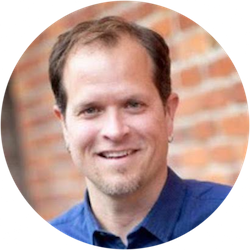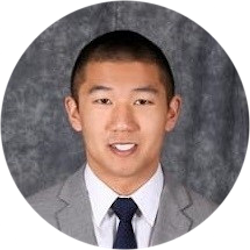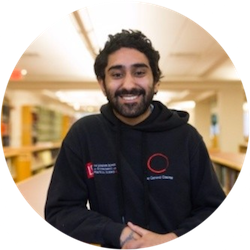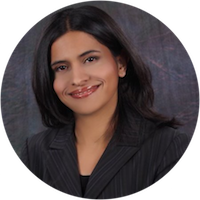The following Links, Papers and Media are the result of research, connections and stories originating from this event:
Links:
Check out the projects on our Github.
Read the Knowledge Reference Doc, by Avanti Shrikumar.
Papers:
“Cellular State Transformations Using Deep Learning for Precision Medicine Applications” - Cell
Media:
Students learn about their ‘superpower’ from a Silicon Valley cancer survivor - 11/30/20, Published following the second research case for Bill.
Sprint for the Cure: p1RCC Hackathon. - SVAI on Medium
TRAINING AND APPLYING GENOMIC DEEP LEARNING MODELS - Inside DNANEXUS
DNA ‘Hackathon’ Looks for Cure of Man’s Rare Cancer - Courthouse News Service
Hacking Rare Disease - Rare Daily
Kidney Cancer Stories, Papillary Renal Cell Carcinoma (pRCC): Symptoms, Diagnosis, Treatment - The Patient Story
INTRODUCTION
We are excited to announce the second computational cancer genomics event in SVAI's Collaborative Research Series. This event will focus on papillary renal-cell carcinoma type 1 (p1RCC), in partnership with RareKidneyCancer.org, Salesforce, Google, NIH, and NCBI.
We will invite 150 researchers, engineers and enthusiasts to join us at Salesforce in San Francisco for an intense weekend of exploration in computational biomedicine. Interdisciplinary teams will work to further understand, develop potential interventions and advance the standard of care for p1RCC. In addition to sequencing a patient for this event, we will use genomic datasets for p1RCC through the NIH's Cancer Genome Atlas.
BACKGROUND
Papillary renal-cell carcinoma, accounts for between 15 to 20% of all kidney cancers. It occurs in the cells lining the small tubules in the kidney that filter waste from the blood and make urine. Little is known about the genetic basis of sporadic papillary renal-cell carcinoma, and no effective forms of therapy for advanced disease exist.
PURPOSE
Advance papillary renal-cell carcinoma research.
Contribute to real, ongoing patient case.
Create interdisciplinary opportunities for computer scientists and biologists.
Learn and develop skills in AI/ML, computational biology and cancer genomics.
Build an open community for collaborative biomedicine discovery.
DATASETS
[1] SVAI facilitated sequencing for one p1RCC patient (paid for by UCSF Health): RNA and DNA Whole Genome Sequencing for Tumor and Blood samples, sequenced at 90x using a BGISEQ-500. The data will be available as .bam and .vcf files.
Detailed write up on the dataset
Register your team to get access to the dataset (For accepted in-person and remote participants)
[2] NIH Cancer Genome Atlas (TCGA) for data for Papillary Renal Cell Carcinoma which includes: RNA-Seq gene expression, identifiable germ-line mutations and some clinical information:
PROBLEM TRACKS
Exploration of disease pathology and current development efforts/ongoing clinical trials
Identification of genomic characteristics and driver events of p1RCC.
Ranking somatic mutations of p1RCC.
Targeting methods for getting constructs into the RCC cells.
Identifying gene locations where CRISPR or zinc finger can be applied for treatment.
Identifying off-label therapeutics through mutational homogeneity.
Orthogonal assessment of mutated alleles by tumour RNA.
In Silico HLA Typing Using Standard RNA-Seq Sequence Reads.
Predicting likelihood of mutated peptides binding autologous HLA-A or HLA-B proteins.
Create a novel drug intervention with DeepChem.
Create a pRCC clonal evolution model using sequencing info from individual pRCC cases. Here's an similar model for chRCC.
Analyze the gene expression signature and come up with a treatment regimen. See here.
SUGGESTED READINGS
We've put together a list of (optional) selected readings to help you prepare for this event.
WHY YOU SHOULD COME
Advanced learning in computational biology and cancer genomics.
Great mentoring sessions.
Make new friends.
Connect with us and our event partners.
Our first research event was amazing, and this one will be even better.
MASTERS OF CEREMONY
Ben Busby, PhD
Computational Biology Branch, NCBI, NLM, NIH
[MC, Mentor, Judge]
Ben leads the NIH's efforts to partner with Genomics hackathons. His research interests include generation of clustering algorithms for analysis of large gene families and whole genomes and Phylomic Analysis of Gene Transfer Events. Ben holds a PhD in Biochemistry and Molecular Biology from University of Maryland, Baltimore.
KEYNOTE
Dr. James Hsieh, MD, PhD
Professor, Washington University in St. Louis
Department of Medicine, Oncology Division, Molecular Oncology, Medical Oncology
Dr. James Hsieh, MD, PhD, one of North America’s foremost Kidney cancer experts, will be providing the keynote address. Dr. Hsieh is a professor at Washington University's School of Medicine. His research spans Kidney cancer metabolomics, Genomics, Epigenetics, Therapeutics, Precision Medicine, drug development and more.
INVITED RESEARCH PRESENTATION
Dr. Alex Feltus
Professor, Clemson University, Bioinformatics
Clemson University has been working on Translating gene-chemical molecular signature interactions between six tumor subtypes, and will present their findings for:
Sorting the entire TCGA panCancer Atlas with t-SNE.
Identifying TCGA gene expression signatures that are common and unique between Kidney Chromophobe (KICH), Kidney Renal Clear Cell Carcinoma (KIRC), and Kidney Renal Papillary Cell Carcinoma (KIRP).
Characterizing KIRP-specific molecular signatures including interactions with possible therapeutics.
SPEAKERS
Jyotika (Jo) Varshney, DVM, Ph.D.
Co-founder and CEO, VeriSIM Life
Jyotika is a doctor of veterinary medicine (DVM). She received her M.S. in Veterinary Pathology and Pathobiology from Penn State University, focusing on gut microbiome analysis for colitis patients. She received her Ph.D. in Comparative Oncology/ Genomics/CS from University of Minnesota-Twin Cities in 2015, where she identified small compounds for Osteosarcoma that is in Phase 1 trials.
She has worked on biotechnological solutions for mental and physical health issues, using machine learning to forecast colon cancer as a Scientific Advisor at CounteractIO, and was a UCSF Postdoctoral Fellow working on developing techniques to interrogate behaviors of pancreatic and lung cancer. Jyotika also served as a Visiting Research Scientist at Genentech working on understanding the mechanisms of toxicities induced by antibody drug conjugates.
Dr. Varshney is currently the CEO and co-founder of VeriSIM Life.
She led one of the winning teams from our previous NF2 Research Hackathon.
Avantika Lal, Ph.D.
BRCA Foundation Young Investigator at Stanford University
[Speaker, Mentor and Judge: Attending Sunday]
Avantika is a BRCA Foundation Young Investigator at Stanford University. Previously, Avantika discovered clinically relevant subtypes of 21 cancers by developing CIMLR, a novel clustering algorithm for multi-mic data, while working as a Postdoctoral Researcher at Stanford University. Avantika also developed a machine learning algorithm to identify mutational process active in cancer and neural networks to identify potential antimalarial drug targets. Avantika received her Ph.D. in Genomics from the National Centre for Biological Sciences in India.
Avantika led one of the winning teams form our NF2 Research Hackathon.
Steven Tamm
CTO, Salesforce
Steven is the CTO of Salesforce, where he develops and oversees overall technical strategy across the company to unify the experience for end-users, administrators and developers. Steven’s experience spans Software Architect for Cloud Computing, eCommerce, Virtualization, Developer Tools, and Software as a Service. Extensive experience in Technical M&A, Corporate Development, Integration, Market Strategy, and advising ground-level startups. He is a graduate from MIT and started his career at Calico Commerce.
Bill Paseman
Founder, RareKidneyCancer.org
Bill Paseman has been in Silicon Valley since 1980. He was the Founder and Chairman of Calico Commerce from 1994-2000 and currently focuses on Angel Investing through Paseman & Associates, and advancing rare kidney cancer research and patient advocacy through RareKidneyCancer.org.
Ioana L. Aanei, Ph.D.
Entrepreneurship Program Manager & Scientific Analyst, UCSF QB3
Ioana is the Entrepreneurship Program Manager and a Scientific Analyst at QB3 Startup in a Box program. Previously, Ioana was a Graduate Student Research Affiliate at Lawrence Berkeley National Laboratory, where she optimized existing radiolabeling procedure two fold, streamlined data analysis to allow for more facile radioactive decay correction and specific activity calculations, and more. Prior to that, she worked as the Vice-chair of Graduate Student Liaison at BPEP. Ioana received her Ph.D. in Chemical Biology from University of California, Berkeley and B.S. in Chemistry with Honors from California Institute of Technology.
Onno Faber
Founder, RDMD
Onno is the Founder of RDMD, formerly NF2 Project He previously founded several other startup companies (such as Tapstack), and now focuses full time on RDMD, a patient organization focused on research and treatment options for Neurofibromatosis type 2 and other rare diseases. He will talk about his experience from the first SVAI research event. Onno has engaged in a life long pursuit of creating things and solving problems. He studied architecture, receiving his degree in 2006 ( honors).
Sam De Brouwer
Co-founder and COO, doc.ai
Sam is the cofounder and Chief Operating Officer at doc.ai, a blockchain AI platform that enables deep learning computations on quantified biology to develop personalized health insight and predictive models. Prior to doc.ai, Sam co-founded Scanadu where she served as VP for Communications. As a member of TED, Sam has ogranized TEDxBrussels and she has been organizing TEDxSanFrancisco since 2016.
Sean Davis, Ph.D.
Staff Scientist, National Cancer Institute
[Speaker, Mentor]
Bioinformatics and cancer researcher, pediatric oncologist, Bioconductor developer,
Bharath Ramsundar PhD
Stanford; UC Berkeley; DeepChem Author
[Attending Saturday]
Bharath Ramsundar received a BA and BS from UC Berkeley in EECS and Mathematics and was valedictorian of his graduating class in mathematics. He recently completed his PhD in computer science at Stanford University with the Pande group. His research focuses on the application of deep-learning to drug-discovery. In particular, Bharath is the creator and lead-developer of DeepChem, an open source package that aims to democratize the use of deep-learning in drug-discovery and quantum chemistry. He is supported by a Hertz Fellowship, the most selective graduate fellowship in the sciences.
Patrick Hop
Principal Deep Learning Engineer, Numerate, Inc.
[Speaker, Mentor]
Patrick is leading AI research at Numerate, a computational drug design company. Previously Patrick founded DeepCrystal, and Artificial Intelligence company that catered to the pharmaceutical sector. DeepCrystal worked with some of the most iconic companies in the industry and was acquired by Numerate. Patrick graduated from UC Berkeley in Applied Mathematics: Computer Science.
Judges
Vladimir Vacic, Ph.D.
Senior Scientist, Computational Biology, 23andMe Therapeutics
Vladimir joined 23andMe in 2015 and manages the Computational Biology group within the Research team. He leads the analysis of research sequencing data and works closely with the Therapeutics team on computational analysis of candidate drug targets. Prior to joining 23andMe, he was one of the founding scientists at the New York Genome Center, where he was leading a cancer genome analysis and computational biology group. Vladimir earned his Ph.D. in Computer Science from the University of California, Riverside and trained as a postdoctoral fellow in computational genetics at Cold Spring Harbor Laboratory and Columbia University.
Alex Furman
Co-founder & Culture and People Analytics, Invitae
Alex is a co-founder at Invitae where he works on software development, people analytics, and business strategy. Alex is also on the Board of Directors for EcoShift Development. Previously, Alex was a Lead Software Engineer where he oversaw the design and implementation of the Navigenics technology platform; he also leveraged this platform to launch Navigenics Health Compass, Navigenics Annual insight, and Scripps Genomic Health Initiative. Prior to this, Alex worked as a Senior Software Engineer at Iris Financial Solutions to guide business analysts in technical requirements definition and planning and laid foundation of a performance team. Alex also worked as a Principal Engineer at GuidedChoice under Nobel Prize Winner Harry Markowitz where he managed a distributed team of developers and guided the integration platform.
MENTORS
Shiva Amiri, Ph.D.
Director, Data Science, Zymergen, Inc.
[Attending Saturday Morning]
Shiva Amiri is the Director of Data Science at Zymergen Inc. a technology company in the San Francisco Bay Area focused on Biology, Automation and Data Science. She was previously the CEO at BioSymetrics Inc., a machine learning company specializing in complex biomedical data. Prior to BioSymetrics she was the Chief Product Officer at Real Time Data Solutions Inc., she has led the Informatics and Analytics team at the Ontario Brain Institute and she was the head of the British High Commission’s Science and Innovation team in Canada. Shiva completed her Ph.D. in Computational Biochemistry at the University of Oxford and her undergraduate degree in Computer Science and Human Biology at the University of Toronto.
Keith Nykamp, Ph.D.
Senior Scientist Group Lead, Invitae
Dr. Nykamp has been studying the influence of genetic variation on phenotype in academic and diagnostic settings for more than 15 years. He’s been with Invitae since 2013 and leads the effort to establish and maintain a reliable evidence-based system for variant classification. Before joining Invitae, Dr. Nykamp worked as a molecular geneticist and director of next-generation sequencing at Prevention Genetics.
Avanti Shrikumar
Stanford; MIT
Avanti is a Ph.D student in the Department of Computer Science at Stanford, advised by Professor Anshul Kundaje. She has develop broadly-applicable methods to make deep learning models interpretable, and has applied these methods to study regulatory genomics. Avanti has a Bachelor's in Computer Science with Molecular Biology from MIT and spent a year working as a developer for the Healthcare team of Palantir Technologies before starting her PhD. Read more at Avanti's Stanford page.
Liezl Puzon
Software Engineer, Facebook
Liezl is a Software Engineer at Facebook where she works on Neural Machine Translation. Previously she was a Software Engineer at Kiron Open Higher Education and interned at Facebook, Google, and Fidelity National Information Services. Liezl is the winner of Generation Google Scholarship winner and Google Code-In Grand Prize. Liezl received her B.S. in Computer Science from Stanford University.
Clayton Mellina
"My current interests are primarily in deep learning for computer vision, image search, and visual similarity search. I am also particularly interested - both from a research perspective as well as a productization perspective - in intelligent systems that allow users to express search intentions or information-needs in nuanced ways that are otherwise difficult to express by language or classical search tools." Clay complted his graduate studies at Stanford University with a dual focus in Human-Computer Interaction and Artificial Intelligence. Prior to joining Google, he worked on Computer Vision and Machine Learning Team at Yahoo on many topics, including scaling deep learning and computer vision technologies for Yahoo products, product integrations, large-scale approximate nearest neighbor search, deep learning for visual similarity search, and visualization tools."
Clinton Mielke, Ph.D.
Founder, infinome ; Data Scientist, UCSF Memory and Aging Center
Clinton is the Founder of infinome and a data scientist at UCSF Memory and Aging Center. Previously he worked as a Research Associate at the Mayo Clinic and the Biodesign Institute in Arizona State University, and an Analyst at the Shadowserver Foundation, a Staff Research at the Artificial Intelligence Lab at the University of Arizona. Prior to these positions, Clinton worked at NASA Ames Research Center as a Software Engineer, at Steward Observatory as a Scientist and a Scientific Programmer at the Arecibo Observatory. Clinton received his Ph.D. in Biomathematics, Bioinformatics, and Computational Biology from the Biodesign Institute of Mayo Clinic.
Marianne Camargo, MD. MSCR.
Nephrologist
[Attending Saturday and Sunday Afternoon]
Marianne graduated from UMDNJ-New Jersey Medical School and did her residency in Internal Medicine at Cornell. After finishing her residency she joined a research fellowship track and developed projects in health literacy, quality improvement and communication skills, at Mount Sinai Hospital in New York. She then pursued nephrology sub-specialty fellowship training to diagnose and treat kidney diseases. As part of her fellowship, she is currently engaged in biomedical clinical research with a focus on understanding the complex link between kidney disease and cancer, including the potential nephrotoxic effects of anti-neoplastic treatments. She has been practicing clinical medicine for almost 10 years and is board certified in Internal Medicine and Nephrology.
Ryan Leung
Director of Research & Partnerships, SVAI; Technical Development Engineer, Genentech
Ryan leads Research and Partnerships at SVAI and is an Engineer in Pharma Technical Operations at Genentech. At Genentech, his work spans the complete end-to-end development process of biologics, ranging from bioanalytical protein characterization to global manufacturing campaigns. Previously, Ryan was a researcher at the SENS Research Foundation and the Tufts University School of Medicine focused on applications of biomaterials and tissue-engineered constructs as human therapeutic and disease modeling platforms, as well as enabling technologies for such products.
Nina Sardesh
Research, Partnerships and Fundraising Member, SVAI; Clinical Trial Assistant for Aerotek, Verily Life Sciences
Nina is a Clinical Trial Associate at Verily LIfe Sciences and a Product Management Consultant at LynxCare Clinical Informatics. Previously, Nina worked as a Clinical Research Coordinator at UCSF and a Research Associate at NASA Ames Research Center.
Parikshit Sharma
Analyst, IndieBio
Parikshit is an Analyst at IndieBio where he leads analysis, modeling, and automation for the IndieBio data pipeline and portfolio, researches life science VC and market landscape, assists investment committee with due-diligence on computational biology startups, and supports portfolio companies with fundraising and financial modeling.
Ankita Das
Marketing Manager, MEDGENOME, Inc
[Attending Saturday Afternoon]
Ankita specializes in studying Epigenetic mechanisms that regulate stem and progenitor cell differentiation during development. She has extensive experience in studying various vertebrate organisms including zebrafish and mice to study in vivo developmental processes, using imaging & genetic strategies. She is enthusiastic about entrepreneurship, and has designed a mentoring program serving Hopkins fellows considering careers in entrepreneurship / start-ups and venture capital strategists. She also serves on the board of Innovation Factory at JHU Carey School of Business to facilitate team building and peer mentoring between business school and science students interested in Entrepreneurship.
**More Speaker, Judges, and Mentors coming soon**
FEATURED PARTICIPANTS
First Round
Rene Lopez - Staff Bioinformatics Scientist and Software/ Machine Learning Engineer, Viome
Biter Bilen, Ph.D. - Omics Data Scientist/ Postdoctoral Research Scholar, Stanford University School of Medicine
Delasa Aghamirzaie, Ph.D. - Postdoctoral Fellow, University of Washington
Prasun Mishra, Ph.D. - Founder & CEO, Agility Pharmaceuticals
Michael Sims - Founder & CEO, Ceres Robotics
Brian Spiering - NLP & AI Researcher and Computer Science Professor, University of San Francisco
Nitish Mishra, Ph.D. - Instructor, University of Nebraska Medical Center
Second Round
Nandita Damaraju - Data Scientist, Thermo Fisher Scientific
Sagar Jain - Graduate Advisor in Digital Medicine, Stanford SHIFT ; GDSM/Information Architect in PD Biometrics, Genentech
Yuri Bendana - Bioinformatics Programmer, Sangamo BioSciences
Matthew Mingay - Founder and Executive, DataSense UBC ; Bioinformatics Scientist, Lawrence Berkeley National Laboratory
Saki Shimizu - Senior Scientist, Maverick Therapeutics
Ron Boger - Machine Learning Researcher, John Hopkins University
Rahim Hashim - Director, FundRx ; Computational Research Specialist, Berke Neuroscience Lab at UCSF
ORGANIZERS
This event was organized by the SVAI Team. Feel free to reach out to any of us.
COMPUTATIONAL POWER
Google has provided $150,000 in cloud credits for our Research Series. Please create a Google Cloud Account. At the event we will add you to pre-provisioned projects set up under SVAI that have access to the patient data.
TEAM FORMATION
Most teams will be formed on the opening night of the event. Please use #p1rcc-teams to help find a team to join, in addition to meeting people in person.
AGENDA
EVENT COMMUNICATIONS
MENTORING
We'll introduce our mentors at the beginning of the event. When you have questions, reach out to them! They will around the event and you can reach them on slack as well.
The official event hashtag is: #SolveP1RCC.
We will use Twitter for live announcements and updates from the event. Follow us at @SVAIresearch.
We'll periodically be sharing event updates on our Facebook page: SVAI Facebook.
YOUTUBE
All the talks from this event will be recorded and made available on SVAI's Youtube Page.
SUBMISSIONS
We'd like to see submissions follow the same format as an (abbreviated) academic poster. Submissions are not restricted to this format and we encourage you to be as creative as you want. Push to Github.
Introduction.
Purpose.
Approach.
Methods / Algorithms / Models.
Results and Discussion.
FINAL PRESENTATRIONS
Each team or individual will have 5 Minutes to present what they worked on. Presentations will be fast! But don't worry, we will link submissions here afterwards so you can get a closer look at what everyone worked on.
JUDGING CRITERIA
Each presentation will be judged on the following criteria weighted in this order:
How well does the solution lead to positive outcomes for Rare Kidney Cancer patient treatment?
How novel is the approach to finding a solution?
Quality and depth of the problem analysis.
Team dynamics, diversity, and intersectionality including cross discipline and specialization collaboration.
PRIZES
Coming Soon.
TERMS OF SERVICE
Please read our full Terms of Service and data usage agreement.
FORMAT
Weekend Hackathon (Not an overnight event)
TECHNICAL LEVEL
This is a technically intensive event, both from a computer science and bio / genomics perspective. Our target audience is Computer Scientists, AI/ML Researchers, Computational Biologists, Genomic Researchers. Students in any of these areas are especially encouraged to apply!
VENUE
Salesforce
121 Spear St. @Rincon Cafe
San Francisco, California 94105
HOUSING & TRANSPORTATION
Please join #bay-area-housing and #transportation to coordinate housing and ride shares with other participants.
BART Transit: 0.2 miles from Embarcadero Station.
FOOD & DRINKS
5/18 Dinner: Freshroll Vietnamese Bowls.
5/19 Breakfast: Specialty's Pastries, Oatmeal, Fruit.
5/19 Lunch: Sweet Greens Salads.
5/19 Dinner: Chipotle Burritos.
5/20 Breakfast: Assortment of Breakfast foods from Whole Foods.
5/20 Lunch: Subway Sandwiches.
5/20 Happy Hour: Beer, Wine, Drinks and Pizza.
Standard Event Disclosures
We have a pretty thorough FAQ, please check it out here: FAQ.
CODE OF CONDUCT
Our conference is dedicated to providing a harassment-free conference experience for everyone, regardless of gender, gender identity and expression, age, sexual orientation, disability, physical appearance, body size, race, ethnicity, religion (or lack thereof), or technology choices. We do not tolerate harassment of conference participants in any form. Sexual language and imagery is not appropriate for any conference venue, including talks, workshops, parties, Twitter and other online media. Conference participants violating these rules may be sanctioned or expelled from the conference without a refund at the discretion of the conference organizers. For full version, please see: confcodeofconduct.com.
PHOTOGRAPHY
We take photos at our events. Some of these photos will be used on our website. We seek to respect your privacy and ask that if you do not want your photo to appear on SVAI to please email us.
COMMUNICATIONS
By signing up for this event, you will automatically be added to future SVAI announcements.
PROMOTIONS
We do not make announcements for non-SVAI events or conferences at our gatherings. Distribution of flyers, printed media or other non SVAI related materials is not allowed at our events.
IMPORTANT
This gathering is limited to 150 people. You MUST be pre-registered to attend. Registration must include your First and Last name, and some of our venues require ID for entry. You do not need to print a paper ticket. We will be checking people in the building lobby. Questions or comments? Tweet to us @SVAIresearch.











































